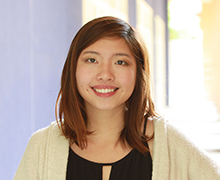Sunny graduated from UCI in 2015 as a magna cum laude graduate having triple majored in Public Health, International Studies, and Anthropology. Sunny was a recipient of the Chancellor’s Award of Distinction and awarded the School of Sciences’ Order of Merit Award. Sunny was awarded the Fulbright Scholar Program in 2015-16 to conduct public health research in Nigeria. Additionally, she served in the Peace Corps for the Community and Youth Empowerment Project in Fiji. Her research interests include immunology, epidemiology, disaster medicine, and the emergency response to Ebola. She plans to earn a doctorate in Global Health as well.

Nigeria seems like an odd choice for those applying for a Fulbright Scholarship. The statistics says it all. The majority of Fulbright applicants choose their destination in the Western Hemisphere or in emerging economic powerhouses in the East. Additionally, Nigeria’s international reputation is tainted by news stories that reduces the country to a few keywords: Boko Haram, abductions, political instability, economic recession, and corruptions.
To have the words “Nigeria” and “good” in the same sentence is highly unusual. Therefore, I was not surprised to find many puzzled faces when I announced my departure to Nigeria in late March to embark on a journey of curious discoveries.
In my previous trips to Africa, I ventured on a life-changing journey to Kenya. Then, as a naive teenager, I was stunned by the beauty of Kenya and its people. Like many Americans and people from other parts of the world, I assumed that the word “Africa” is synonymous with disease, poverty, and suffering. My experience in Kenya was a life changing one where I found my passion and direction in life undergoing a paradigm shift. I longed to return to Africa with greater humility, knowledge, and skills.
My first impression of Nigeria came from Nigerian authors such as Uzodina Iweala and Chimamanda Ngozi Adichie. These author’s work challenged the West’s stagnant and biased view of Nigeria as the most populated country on the African continent.Iweala and Adichie told the true story of Nigeria through shedding light on the richness of Nigerian history, portraying the diversity within their culture, and highlighting the complexity of their social issues.
Following the 2014 Ebola outbreak in Lagos (a metropolitan center with a population of over 22 million), Nigeria became the poster child of the international public health community overnight. I arrived in Lagos with little expectations and much hope to learn about a country as culturally diverse as Nigeria. However, there were many obstacles awaiting me. Despite these obstacles, my Fulbright experience has become an opportunity for self-reflection, discovery, and character building.